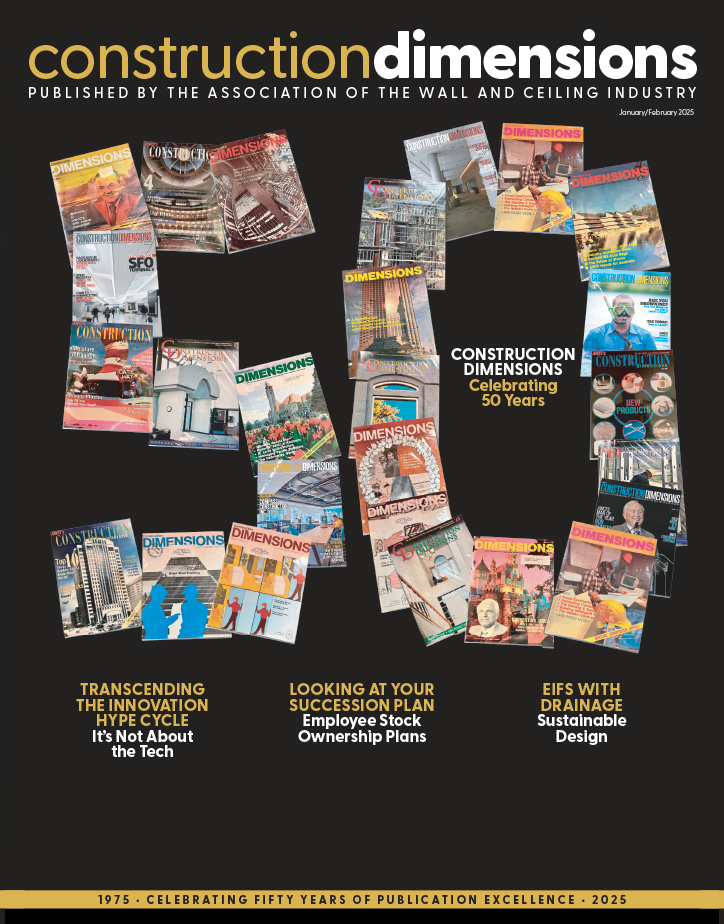When Travis Winsor got down to business on July 1 as the president of the Association of the Wall and Ceiling Industry, his goal was to build on the “solid foundation” of his predecessors—AWCI’s recent past presidents, and he will shine a light on the AWCI’s “valued resources that are more important than ever” to member companies in uncertain economic times.
Health and safety is top of mind, and he is committed to assisting AWCI in its efforts to help companies bolster programs and set new initiatives. “I know all of our member companies are more sophisticated on safety protocols and safety supports than ever, and we have a good safety culture but the general culture needs to be improved,” Winsor says.
The end goal is to see all workers go home safely after work every day, says the president and CEO of The Raymond Group, one of the top drywall, framing and specialized finish subcontractors on the West Coast.
Mental Health Matters
But it is not just the physical safety of workers that Winsor is concerned about. Their mental health needs to be an industry priority as well.
It can be difficult to determine who needs mental help in an industry of workers not known to display emotional weakness. “It is not always obvious when someone is in an emotional crisis as it is when someone needs first aid because they don’t have a laceration or other physical injury,” he says.
But the statistics on suicide rates—four times higher in construction than in the general population—are a telltale sign that mental health needs to be addressed. Winsor supports AWCI’s efforts to heighten awareness of mental illness in construction to help reduce the stigma workers face to getting help, either from professionals, employers, fellow workers or friends and relatives.
A recent suicide of a worker in another trade on a job site where Raymond was a subcontractor impacted everyone on site. “That pain everyone feels,” he says. “Regardless of what company logo is on your hard hat, we’re all in the same field. … It highlights the significance of mental health and helping people before it gets that bad for them. It is a big thing for me, and I think it has to be a big thing for the industry.”
Like other contractors, Raymond has a comprehensive health benefits program that can help steer employees in need of help to professional resources such as the Construction Industry Alliance for Suicide Prevention (preventconstructionsuicide.com). Trade unions, too, have made a “significant push” to develop mental health initiatives. Still, he stresses, “We as an industry need to do a better job.”
Focus on the Future
Winsor believes the next generation of leaders faces “greater pressures” largely because of the ever-complex nature of the industry. One of the initiatives that can help budding executives meet the challenges is the AWCI Emerging Leaders Program. “We all started somewhere, and we need the next generation to have the same or better opportunities than we had,” Winsor says.
Impressed with the enthusiasm and strong work ethic of the crop of young people enrolled in last year’s class of the program, Winsor has high expectations on how their careers will develop. “They are going to be a success,” he says, “and I think part of it is a result of going through this experience.”
Winsor, who came to Raymond in 1997 from a career as an attorney, says his legal background offered him little service in his first role as estimator and manager of special projects for the wall and ceiling contractor. “I knew nothing about this industry,” he says, “but a couple of employees took me under their wing and taught me how to estimate a job, stock a job, take care of the crew and customers and close out a job and get paid for it. They took care of me and helped me understand what the industry is about.”
Those early years at Raymond have much to do with why Winsor sees the importance of mentorship. For many years he has been involved in high schools helping students look at possible career options in the trades. His role in the career connections program between the Newport-Mesa Unified School District and the Southwest Regional Council of Carpenters has been particularly gratifying. “It helps kids who don’t want to follow a four-year degree program go into a meaningful career path in construction,” he says.
He has watched some of those students do exactly that. “I am very proud that I can go on a job site and see people I knew as high school kids who are doing well and have a number of opportunities before them, whether it is in the field, the office or somewhere else in the industry,” he says.
Current Challenges
While the impact of the pandemic is not the driving economic force it was a year ago, the ripple effects, including shortages and higher prices of some materials that contribute to higher overheads, haven’t dissipated. “We at Raymond had some very good years recently but we see margins in the industry coming down and more projects getting delayed or even canceled,” Winsor says.
But as contractors prepare for a downcycle, he suggests it doesn’t appear that it will be as deep as forecasters had projected over the past two years. Chalk that partly up to better-run companies. Managers, who have experienced other downturns, are “much quicker to make adjustments to keep their companies healthy, even when the market is not as robust as it has been in recent years.”
But impending labor scarcities aren’t about to go away, making it more important than ever for the industry to widen its search for new employees. “We are fighting the stigma of an industry made up of the he-man construction worker from generations past, but we need to improve our support for and acknowledgement of diversity, tolerance, inclusion and all of the things necessary from a cultural standpoint to having a dynamic industry,” Winsor explains.
Winsor says Raymond emphasizes the importance of a diverse workforce, regardless of gender, color, ethnicity and sexual orientation, physical or mental abilities. Employees who believe they have been subjected to discrimination that conflicts with the company’s diversity policy and initiatives can seek assistance from a supervisor or a human resources representative.
In 2021, he was one of nearly 2,000 CEOs brought together for the CEO Action for Diversity & Inclusion™ initiative (www.ceoaction.com) aimed at cultivating workplaces with diverse perspectives. The companies in the initiative exchanged ideas on efforts to create new workplace identities.
“With all of these challenges, AWCI becomes even more important as a resource to its members to provide advice, employee development opportunities and technical knowledge,” he adds.
Another area he sees seminal to the wall and ceiling sector’s development is emerging technology—an “exciting” facet that keeps contractors and other AWCI members on their toes. “We need to encourage those people engaged in making the industry better through technological advancement to continue because it will be what continues to make us successful,” he says.
Focus on the Future
At 56, Winsor sees a day coming when his goals will include “slowing down” in the industry, shifting gears to place more emphasis on family life in and around his home in Newport Beach. He has been married for 30 years to Nicolle, “who everybody knows as Nikki,” and the couple has three grown children, Jaclyn, Megan and Davis. While the three kids have chosen careers in fields other than construction, the family shares much in common away from their workplaces, such as water skiing, snow skiing and sailing.
Two years ago, Winsor found himself 1,100 miles southwest of Los Angeles in a lonely spot on the Pacific Ocean, closer to the International Space Station than to the nearest shoreline. He was part of a crew of 14 operating the Compadres, a sailboat in the 2021 Trans Pacific Yacht Race, a nine-day, 2,500-mile run from Los Angeles across the Pacific Ocean to Honolulu.
The journey was challenging and left him at times “exhausted, wet and cold” on the open sea. But there were also times such as late at night under the stars on a calm sea when he could pause and reflect on the value of the experience.
It also might have been a time to reflect on how important working together is to accomplish goals, be it in a sailboat race or on a wall and ceiling job. He explains: “From a team standpoint, on the boat you have to keep going because if one person can’t do his or her job, the whole team is at risk of not doing it safely.”
Christopher Columbus once said, “You can never cross the ocean unless you have the courage to lose sight of the shore.” With Travis Winsor at the helm as AWCI’s 2023–2024 president, AWCI members can expect that he will “lose sight of the shore” and find ways to bring everyone home safely and in good health, and pave the way for the next generation to impact the industry in a positive way.
Don Procter is a freelance writer in Ontario, Canada.





